Strategic Management Report: Rolls Royce Motor Cars Strategic Analysis
VerifiedAdded on 2023/01/18
|16
|4844
|48
Report
AI Summary
This report provides a comprehensive strategic management analysis of Rolls Royce Motor Cars. It begins with an introduction to strategic management and its relevance, followed by an examination of different strategy types and schools of thought, including the design, planning, and positioning schools, and their application to Rolls Royce. The report then utilizes PESTLE and Porter's Five Forces models to analyze the external and competitive environments, identifying key drivers and impacts on the company's competitive position. The analysis extends to assessing the extent of strategic drift within the company, evaluating its vision, mission, strategic capabilities, and conducting a SWOT analysis. Furthermore, the report explores the application of the VRIO model to assess internal resources and capabilities. Finally, it explores strategic choice models to sustain the company's competitive position and analyzes the resource implications of proposed recommendations, concluding with a summary of the key findings and recommendations.
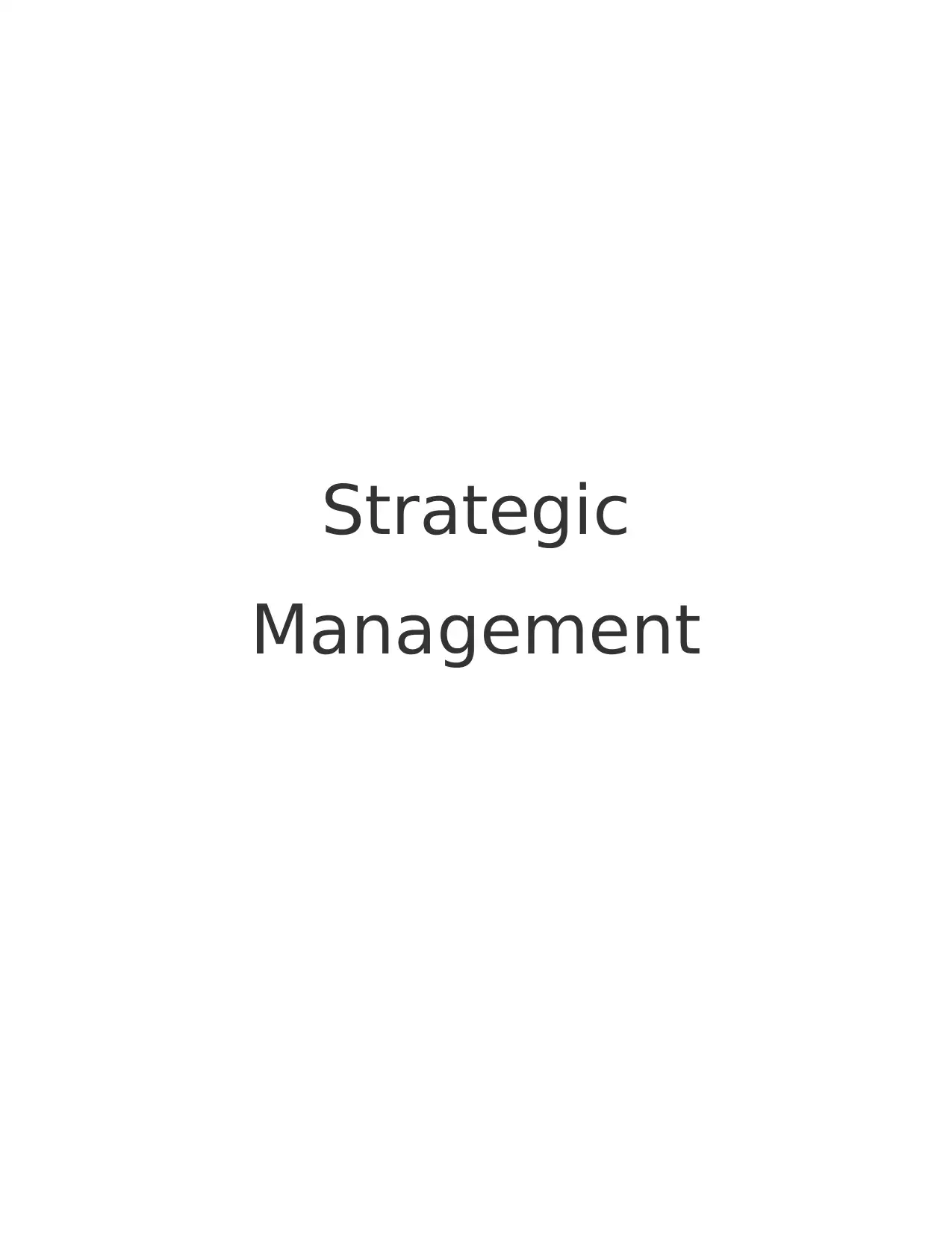
Strategic
Management
Management
Paraphrase This Document
Need a fresh take? Get an instant paraphrase of this document with our AI Paraphraser
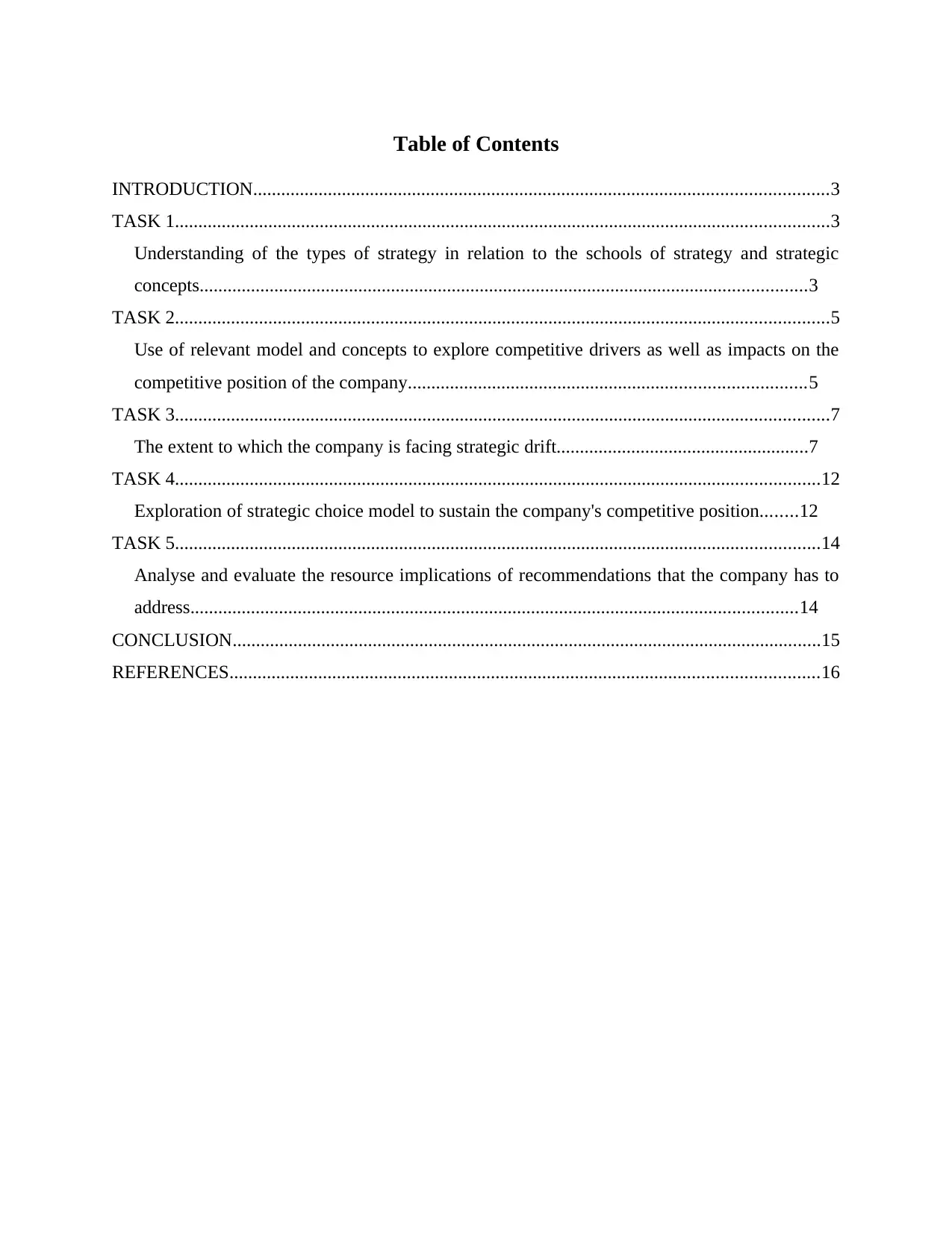
Table of Contents
INTRODUCTION...........................................................................................................................3
TASK 1............................................................................................................................................3
Understanding of the types of strategy in relation to the schools of strategy and strategic
concepts..................................................................................................................................3
TASK 2............................................................................................................................................5
Use of relevant model and concepts to explore competitive drivers as well as impacts on the
competitive position of the company.....................................................................................5
TASK 3............................................................................................................................................7
The extent to which the company is facing strategic drift......................................................7
TASK 4..........................................................................................................................................12
Exploration of strategic choice model to sustain the company's competitive position........12
TASK 5..........................................................................................................................................14
Analyse and evaluate the resource implications of recommendations that the company has to
address..................................................................................................................................14
CONCLUSION..............................................................................................................................15
REFERENCES..............................................................................................................................16
INTRODUCTION...........................................................................................................................3
TASK 1............................................................................................................................................3
Understanding of the types of strategy in relation to the schools of strategy and strategic
concepts..................................................................................................................................3
TASK 2............................................................................................................................................5
Use of relevant model and concepts to explore competitive drivers as well as impacts on the
competitive position of the company.....................................................................................5
TASK 3............................................................................................................................................7
The extent to which the company is facing strategic drift......................................................7
TASK 4..........................................................................................................................................12
Exploration of strategic choice model to sustain the company's competitive position........12
TASK 5..........................................................................................................................................14
Analyse and evaluate the resource implications of recommendations that the company has to
address..................................................................................................................................14
CONCLUSION..............................................................................................................................15
REFERENCES..............................................................................................................................16
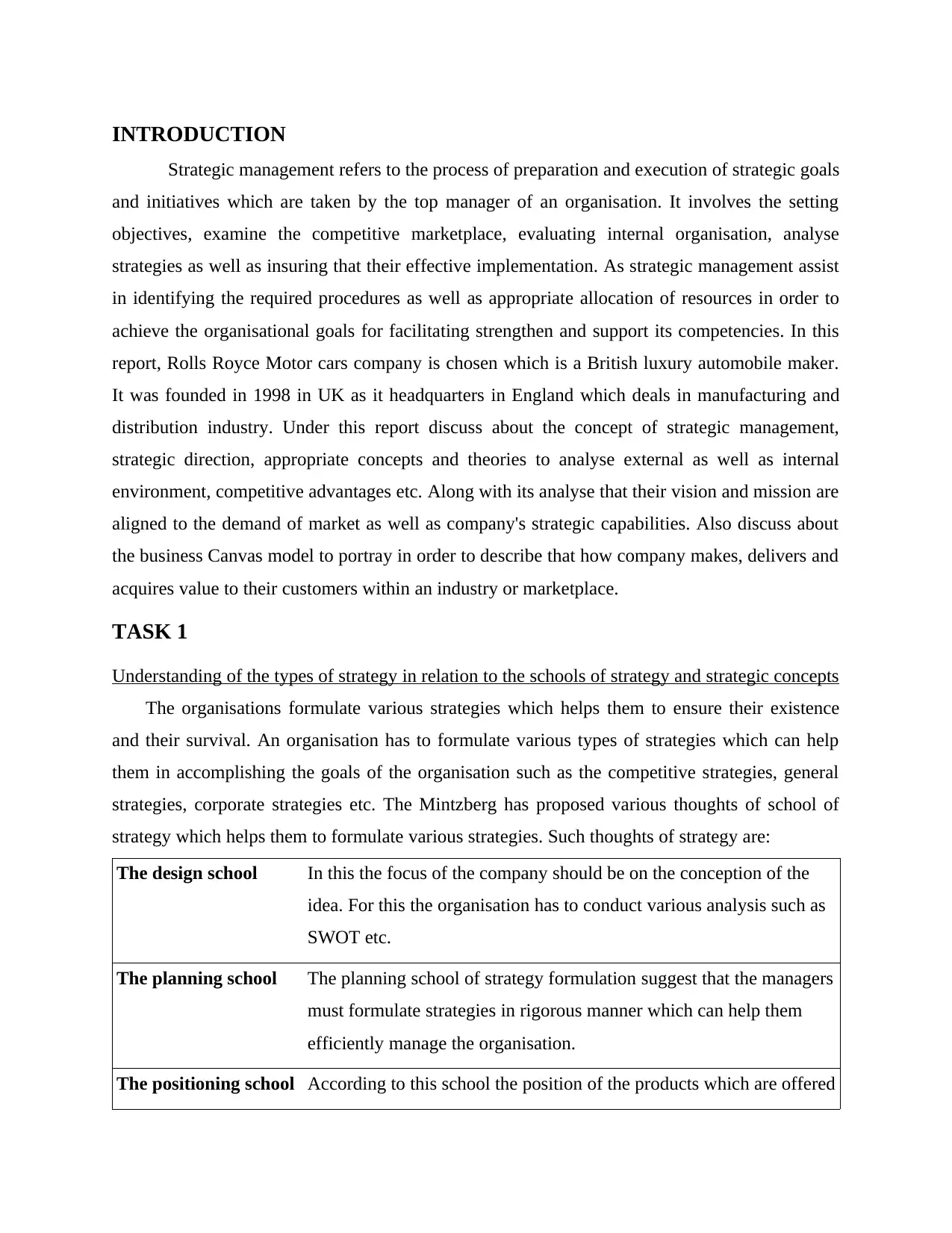
INTRODUCTION
Strategic management refers to the process of preparation and execution of strategic goals
and initiatives which are taken by the top manager of an organisation. It involves the setting
objectives, examine the competitive marketplace, evaluating internal organisation, analyse
strategies as well as insuring that their effective implementation. As strategic management assist
in identifying the required procedures as well as appropriate allocation of resources in order to
achieve the organisational goals for facilitating strengthen and support its competencies. In this
report, Rolls Royce Motor cars company is chosen which is a British luxury automobile maker.
It was founded in 1998 in UK as it headquarters in England which deals in manufacturing and
distribution industry. Under this report discuss about the concept of strategic management,
strategic direction, appropriate concepts and theories to analyse external as well as internal
environment, competitive advantages etc. Along with its analyse that their vision and mission are
aligned to the demand of market as well as company's strategic capabilities. Also discuss about
the business Canvas model to portray in order to describe that how company makes, delivers and
acquires value to their customers within an industry or marketplace.
TASK 1
Understanding of the types of strategy in relation to the schools of strategy and strategic concepts
The organisations formulate various strategies which helps them to ensure their existence
and their survival. An organisation has to formulate various types of strategies which can help
them in accomplishing the goals of the organisation such as the competitive strategies, general
strategies, corporate strategies etc. The Mintzberg has proposed various thoughts of school of
strategy which helps them to formulate various strategies. Such thoughts of strategy are:
The design school In this the focus of the company should be on the conception of the
idea. For this the organisation has to conduct various analysis such as
SWOT etc.
The planning school The planning school of strategy formulation suggest that the managers
must formulate strategies in rigorous manner which can help them
efficiently manage the organisation.
The positioning school According to this school the position of the products which are offered
Strategic management refers to the process of preparation and execution of strategic goals
and initiatives which are taken by the top manager of an organisation. It involves the setting
objectives, examine the competitive marketplace, evaluating internal organisation, analyse
strategies as well as insuring that their effective implementation. As strategic management assist
in identifying the required procedures as well as appropriate allocation of resources in order to
achieve the organisational goals for facilitating strengthen and support its competencies. In this
report, Rolls Royce Motor cars company is chosen which is a British luxury automobile maker.
It was founded in 1998 in UK as it headquarters in England which deals in manufacturing and
distribution industry. Under this report discuss about the concept of strategic management,
strategic direction, appropriate concepts and theories to analyse external as well as internal
environment, competitive advantages etc. Along with its analyse that their vision and mission are
aligned to the demand of market as well as company's strategic capabilities. Also discuss about
the business Canvas model to portray in order to describe that how company makes, delivers and
acquires value to their customers within an industry or marketplace.
TASK 1
Understanding of the types of strategy in relation to the schools of strategy and strategic concepts
The organisations formulate various strategies which helps them to ensure their existence
and their survival. An organisation has to formulate various types of strategies which can help
them in accomplishing the goals of the organisation such as the competitive strategies, general
strategies, corporate strategies etc. The Mintzberg has proposed various thoughts of school of
strategy which helps them to formulate various strategies. Such thoughts of strategy are:
The design school In this the focus of the company should be on the conception of the
idea. For this the organisation has to conduct various analysis such as
SWOT etc.
The planning school The planning school of strategy formulation suggest that the managers
must formulate strategies in rigorous manner which can help them
efficiently manage the organisation.
The positioning school According to this school the position of the products which are offered
⊘ This is a preview!⊘
Do you want full access?
Subscribe today to unlock all pages.

Trusted by 1+ million students worldwide

the company need to be considered as the overall strategy revolves
around such product.
The entrepreneurial
school
As per this, the style of the entrepreneur, their vision etc. needs to be
considered which will help them in making the strategy acceptable by
all.
The cognitive school Cognitive school suggests that the perception of the employees
working in the organisation need to be considered while strategy
formulation.
The learning school As per this school the managers need to learn from the past incidents
and success of the organisation and on the basis of such the strategies
for future must be formulated.
The power school In this type of strategy the decision are taken by the persons who has
authority in the organisation to do so. This is so because they have
knowledge and understanding of various factors that has impact on the
organisation.
The culture School According to this the human and social capital need to consider while
formulating strategy. It will make their employees feel good and will
motivate them to contribute to the organisation.
The environmental
school
This thought of the school of strategy suggest focusing upon the
environmental factors that has impact on the business.
The configuration
school
According to this factor of the thought of school the management need
to focus upon the need to configuring which will help them to move
from one position to other.
These thoughts of school of strategy formulation can be effectively be used by the Rolls
Royce as it will enable them to consider all the factors which they are associated with.
In addition to this the organisation need to consider the strategic concepts which facilitate
the company to understand the situation. This concept will help the Rolls Royce to determine
various terms in context of what is to be done in the organisation (Hill, 2014).
around such product.
The entrepreneurial
school
As per this, the style of the entrepreneur, their vision etc. needs to be
considered which will help them in making the strategy acceptable by
all.
The cognitive school Cognitive school suggests that the perception of the employees
working in the organisation need to be considered while strategy
formulation.
The learning school As per this school the managers need to learn from the past incidents
and success of the organisation and on the basis of such the strategies
for future must be formulated.
The power school In this type of strategy the decision are taken by the persons who has
authority in the organisation to do so. This is so because they have
knowledge and understanding of various factors that has impact on the
organisation.
The culture School According to this the human and social capital need to consider while
formulating strategy. It will make their employees feel good and will
motivate them to contribute to the organisation.
The environmental
school
This thought of the school of strategy suggest focusing upon the
environmental factors that has impact on the business.
The configuration
school
According to this factor of the thought of school the management need
to focus upon the need to configuring which will help them to move
from one position to other.
These thoughts of school of strategy formulation can be effectively be used by the Rolls
Royce as it will enable them to consider all the factors which they are associated with.
In addition to this the organisation need to consider the strategic concepts which facilitate
the company to understand the situation. This concept will help the Rolls Royce to determine
various terms in context of what is to be done in the organisation (Hill, 2014).
Paraphrase This Document
Need a fresh take? Get an instant paraphrase of this document with our AI Paraphraser
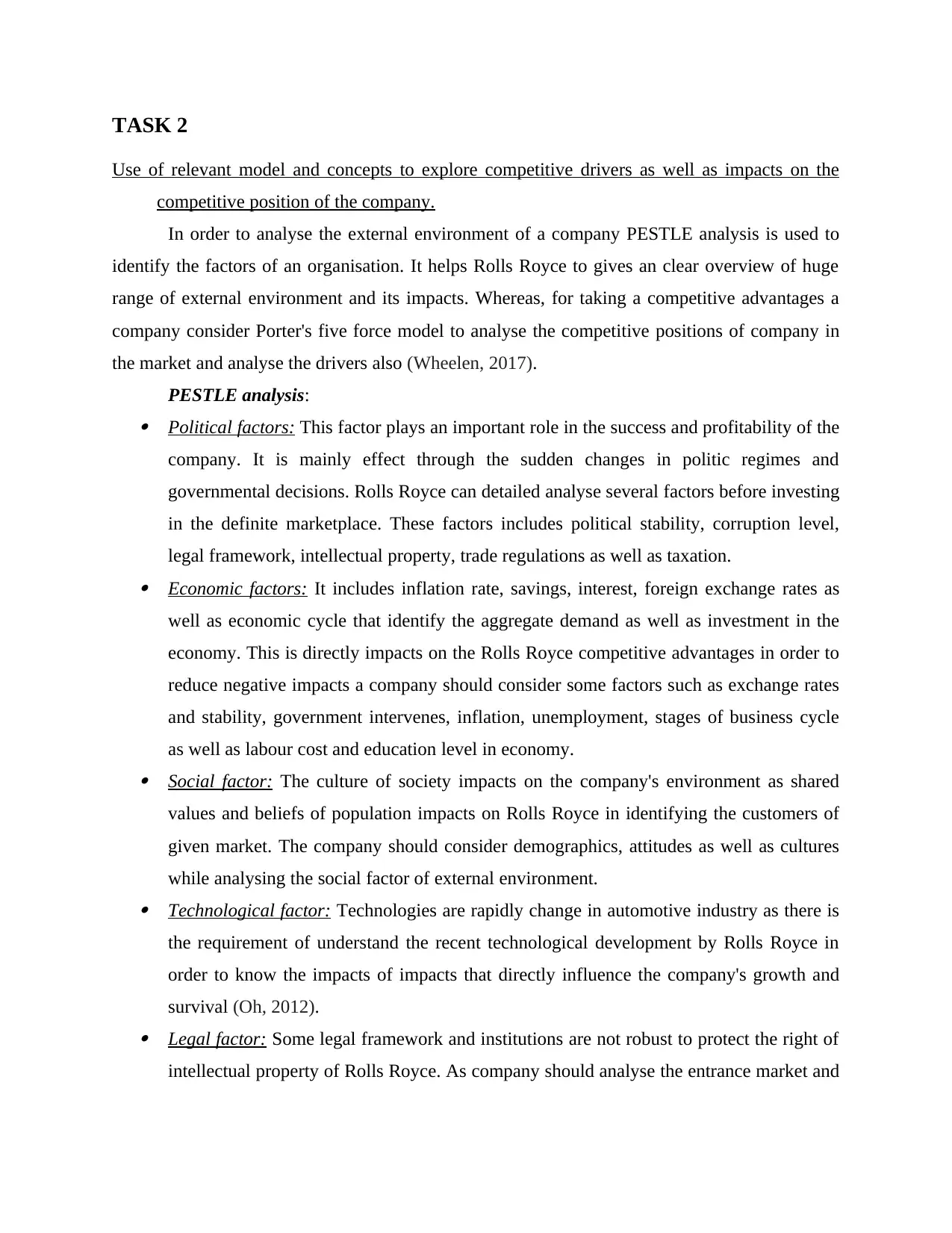
TASK 2
Use of relevant model and concepts to explore competitive drivers as well as impacts on the
competitive position of the company.
In order to analyse the external environment of a company PESTLE analysis is used to
identify the factors of an organisation. It helps Rolls Royce to gives an clear overview of huge
range of external environment and its impacts. Whereas, for taking a competitive advantages a
company consider Porter's five force model to analyse the competitive positions of company in
the market and analyse the drivers also (Wheelen, 2017).
PESTLE analysis: Political factors: This factor plays an important role in the success and profitability of the
company. It is mainly effect through the sudden changes in politic regimes and
governmental decisions. Rolls Royce can detailed analyse several factors before investing
in the definite marketplace. These factors includes political stability, corruption level,
legal framework, intellectual property, trade regulations as well as taxation. Economic factors: It includes inflation rate, savings, interest, foreign exchange rates as
well as economic cycle that identify the aggregate demand as well as investment in the
economy. This is directly impacts on the Rolls Royce competitive advantages in order to
reduce negative impacts a company should consider some factors such as exchange rates
and stability, government intervenes, inflation, unemployment, stages of business cycle
as well as labour cost and education level in economy. Social factor: The culture of society impacts on the company's environment as shared
values and beliefs of population impacts on Rolls Royce in identifying the customers of
given market. The company should consider demographics, attitudes as well as cultures
while analysing the social factor of external environment. Technological factor: Technologies are rapidly change in automotive industry as there is
the requirement of understand the recent technological development by Rolls Royce in
order to know the impacts of impacts that directly influence the company's growth and
survival (Oh, 2012). Legal factor: Some legal framework and institutions are not robust to protect the right of
intellectual property of Rolls Royce. As company should analyse the entrance market and
Use of relevant model and concepts to explore competitive drivers as well as impacts on the
competitive position of the company.
In order to analyse the external environment of a company PESTLE analysis is used to
identify the factors of an organisation. It helps Rolls Royce to gives an clear overview of huge
range of external environment and its impacts. Whereas, for taking a competitive advantages a
company consider Porter's five force model to analyse the competitive positions of company in
the market and analyse the drivers also (Wheelen, 2017).
PESTLE analysis: Political factors: This factor plays an important role in the success and profitability of the
company. It is mainly effect through the sudden changes in politic regimes and
governmental decisions. Rolls Royce can detailed analyse several factors before investing
in the definite marketplace. These factors includes political stability, corruption level,
legal framework, intellectual property, trade regulations as well as taxation. Economic factors: It includes inflation rate, savings, interest, foreign exchange rates as
well as economic cycle that identify the aggregate demand as well as investment in the
economy. This is directly impacts on the Rolls Royce competitive advantages in order to
reduce negative impacts a company should consider some factors such as exchange rates
and stability, government intervenes, inflation, unemployment, stages of business cycle
as well as labour cost and education level in economy. Social factor: The culture of society impacts on the company's environment as shared
values and beliefs of population impacts on Rolls Royce in identifying the customers of
given market. The company should consider demographics, attitudes as well as cultures
while analysing the social factor of external environment. Technological factor: Technologies are rapidly change in automotive industry as there is
the requirement of understand the recent technological development by Rolls Royce in
order to know the impacts of impacts that directly influence the company's growth and
survival (Oh, 2012). Legal factor: Some legal framework and institutions are not robust to protect the right of
intellectual property of Rolls Royce. As company should analyse the entrance market and
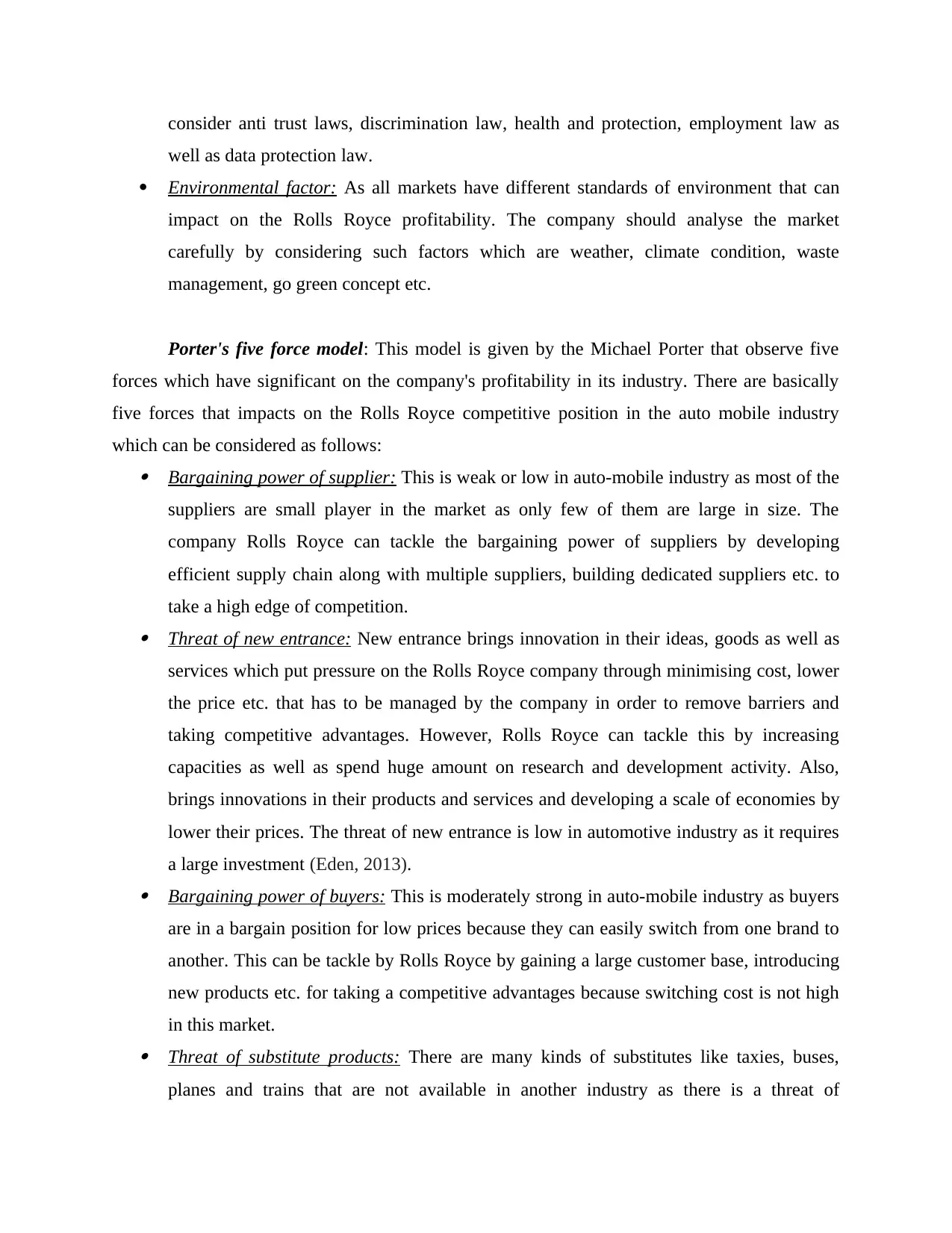
consider anti trust laws, discrimination law, health and protection, employment law as
well as data protection law.
Environmental factor: As all markets have different standards of environment that can
impact on the Rolls Royce profitability. The company should analyse the market
carefully by considering such factors which are weather, climate condition, waste
management, go green concept etc.
Porter's five force model: This model is given by the Michael Porter that observe five
forces which have significant on the company's profitability in its industry. There are basically
five forces that impacts on the Rolls Royce competitive position in the auto mobile industry
which can be considered as follows: Bargaining power of supplier: This is weak or low in auto-mobile industry as most of the
suppliers are small player in the market as only few of them are large in size. The
company Rolls Royce can tackle the bargaining power of suppliers by developing
efficient supply chain along with multiple suppliers, building dedicated suppliers etc. to
take a high edge of competition. Threat of new entrance: New entrance brings innovation in their ideas, goods as well as
services which put pressure on the Rolls Royce company through minimising cost, lower
the price etc. that has to be managed by the company in order to remove barriers and
taking competitive advantages. However, Rolls Royce can tackle this by increasing
capacities as well as spend huge amount on research and development activity. Also,
brings innovations in their products and services and developing a scale of economies by
lower their prices. The threat of new entrance is low in automotive industry as it requires
a large investment (Eden, 2013). Bargaining power of buyers: This is moderately strong in auto-mobile industry as buyers
are in a bargain position for low prices because they can easily switch from one brand to
another. This can be tackle by Rolls Royce by gaining a large customer base, introducing
new products etc. for taking a competitive advantages because switching cost is not high
in this market. Threat of substitute products: There are many kinds of substitutes like taxies, buses,
planes and trains that are not available in another industry as there is a threat of
well as data protection law.
Environmental factor: As all markets have different standards of environment that can
impact on the Rolls Royce profitability. The company should analyse the market
carefully by considering such factors which are weather, climate condition, waste
management, go green concept etc.
Porter's five force model: This model is given by the Michael Porter that observe five
forces which have significant on the company's profitability in its industry. There are basically
five forces that impacts on the Rolls Royce competitive position in the auto mobile industry
which can be considered as follows: Bargaining power of supplier: This is weak or low in auto-mobile industry as most of the
suppliers are small player in the market as only few of them are large in size. The
company Rolls Royce can tackle the bargaining power of suppliers by developing
efficient supply chain along with multiple suppliers, building dedicated suppliers etc. to
take a high edge of competition. Threat of new entrance: New entrance brings innovation in their ideas, goods as well as
services which put pressure on the Rolls Royce company through minimising cost, lower
the price etc. that has to be managed by the company in order to remove barriers and
taking competitive advantages. However, Rolls Royce can tackle this by increasing
capacities as well as spend huge amount on research and development activity. Also,
brings innovations in their products and services and developing a scale of economies by
lower their prices. The threat of new entrance is low in automotive industry as it requires
a large investment (Eden, 2013). Bargaining power of buyers: This is moderately strong in auto-mobile industry as buyers
are in a bargain position for low prices because they can easily switch from one brand to
another. This can be tackle by Rolls Royce by gaining a large customer base, introducing
new products etc. for taking a competitive advantages because switching cost is not high
in this market. Threat of substitute products: There are many kinds of substitutes like taxies, buses,
planes and trains that are not available in another industry as there is a threat of
⊘ This is a preview!⊘
Do you want full access?
Subscribe today to unlock all pages.

Trusted by 1+ million students worldwide
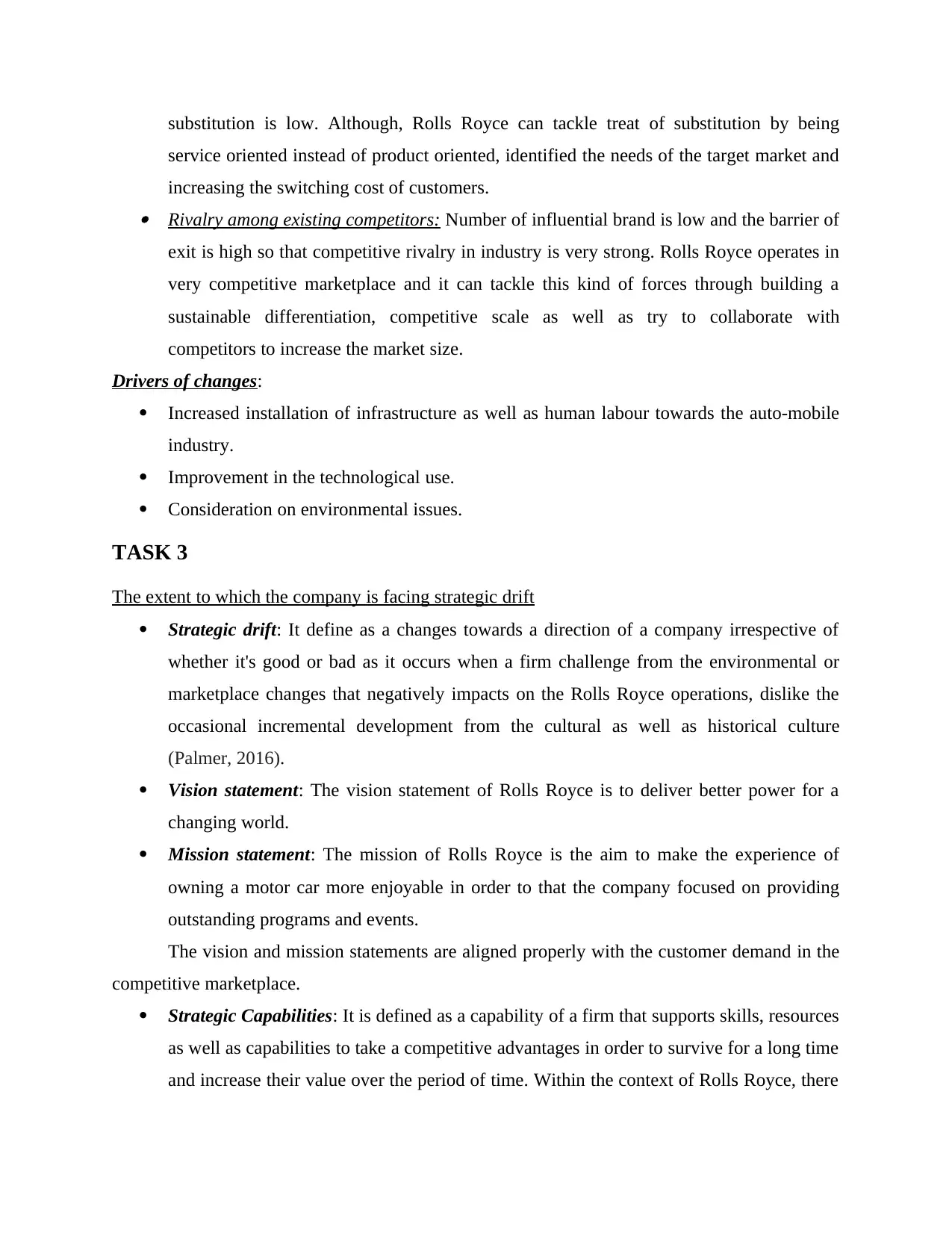
substitution is low. Although, Rolls Royce can tackle treat of substitution by being
service oriented instead of product oriented, identified the needs of the target market and
increasing the switching cost of customers. Rivalry among existing competitors: Number of influential brand is low and the barrier of
exit is high so that competitive rivalry in industry is very strong. Rolls Royce operates in
very competitive marketplace and it can tackle this kind of forces through building a
sustainable differentiation, competitive scale as well as try to collaborate with
competitors to increase the market size.
Drivers of changes:
Increased installation of infrastructure as well as human labour towards the auto-mobile
industry.
Improvement in the technological use.
Consideration on environmental issues.
TASK 3
The extent to which the company is facing strategic drift
Strategic drift: It define as a changes towards a direction of a company irrespective of
whether it's good or bad as it occurs when a firm challenge from the environmental or
marketplace changes that negatively impacts on the Rolls Royce operations, dislike the
occasional incremental development from the cultural as well as historical culture
(Palmer, 2016).
Vision statement: The vision statement of Rolls Royce is to deliver better power for a
changing world.
Mission statement: The mission of Rolls Royce is the aim to make the experience of
owning a motor car more enjoyable in order to that the company focused on providing
outstanding programs and events.
The vision and mission statements are aligned properly with the customer demand in the
competitive marketplace.
Strategic Capabilities: It is defined as a capability of a firm that supports skills, resources
as well as capabilities to take a competitive advantages in order to survive for a long time
and increase their value over the period of time. Within the context of Rolls Royce, there
service oriented instead of product oriented, identified the needs of the target market and
increasing the switching cost of customers. Rivalry among existing competitors: Number of influential brand is low and the barrier of
exit is high so that competitive rivalry in industry is very strong. Rolls Royce operates in
very competitive marketplace and it can tackle this kind of forces through building a
sustainable differentiation, competitive scale as well as try to collaborate with
competitors to increase the market size.
Drivers of changes:
Increased installation of infrastructure as well as human labour towards the auto-mobile
industry.
Improvement in the technological use.
Consideration on environmental issues.
TASK 3
The extent to which the company is facing strategic drift
Strategic drift: It define as a changes towards a direction of a company irrespective of
whether it's good or bad as it occurs when a firm challenge from the environmental or
marketplace changes that negatively impacts on the Rolls Royce operations, dislike the
occasional incremental development from the cultural as well as historical culture
(Palmer, 2016).
Vision statement: The vision statement of Rolls Royce is to deliver better power for a
changing world.
Mission statement: The mission of Rolls Royce is the aim to make the experience of
owning a motor car more enjoyable in order to that the company focused on providing
outstanding programs and events.
The vision and mission statements are aligned properly with the customer demand in the
competitive marketplace.
Strategic Capabilities: It is defined as a capability of a firm that supports skills, resources
as well as capabilities to take a competitive advantages in order to survive for a long time
and increase their value over the period of time. Within the context of Rolls Royce, there
Paraphrase This Document
Need a fresh take? Get an instant paraphrase of this document with our AI Paraphraser
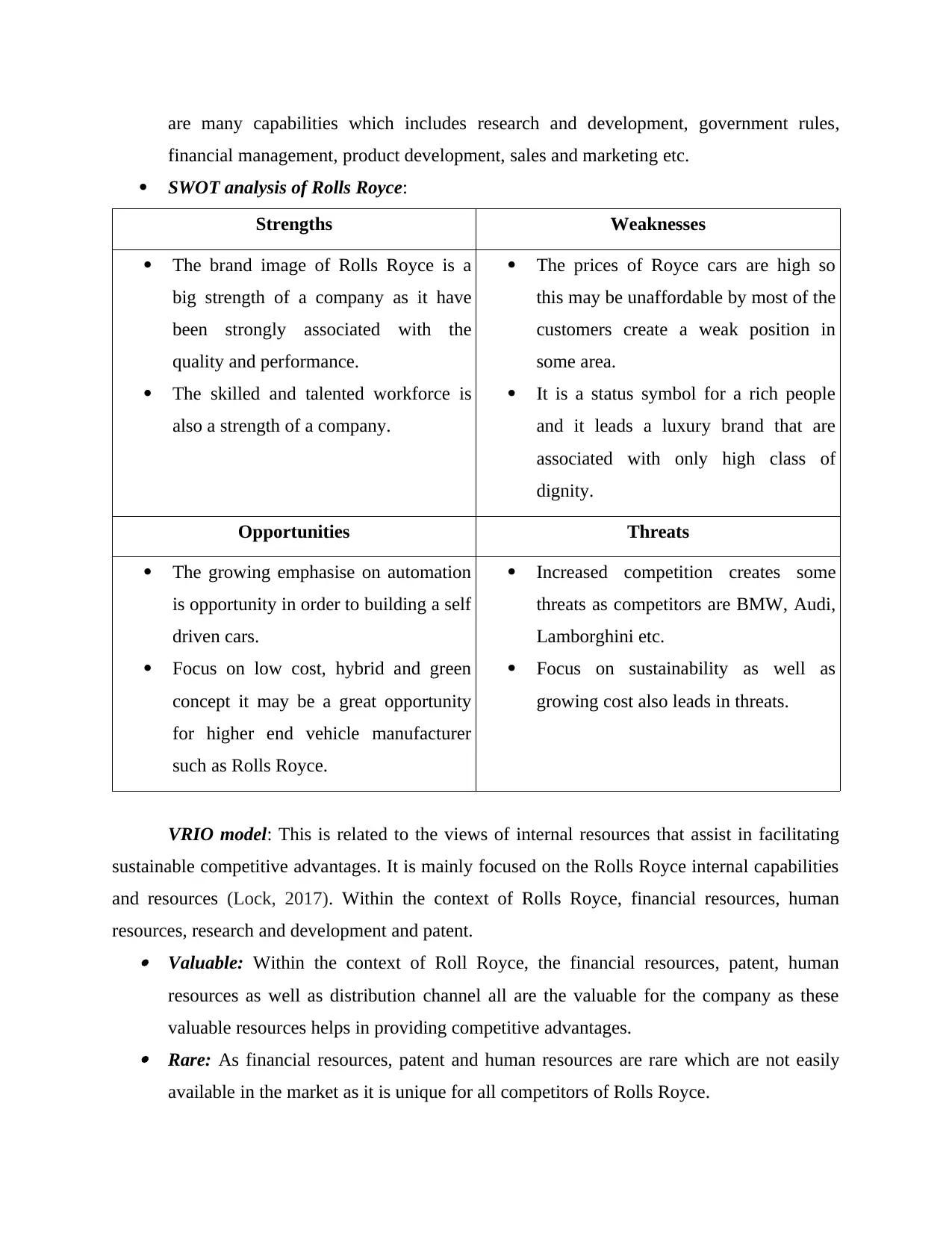
are many capabilities which includes research and development, government rules,
financial management, product development, sales and marketing etc.
SWOT analysis of Rolls Royce:
Strengths Weaknesses
The brand image of Rolls Royce is a
big strength of a company as it have
been strongly associated with the
quality and performance.
The skilled and talented workforce is
also a strength of a company.
The prices of Royce cars are high so
this may be unaffordable by most of the
customers create a weak position in
some area.
It is a status symbol for a rich people
and it leads a luxury brand that are
associated with only high class of
dignity.
Opportunities Threats
The growing emphasise on automation
is opportunity in order to building a self
driven cars.
Focus on low cost, hybrid and green
concept it may be a great opportunity
for higher end vehicle manufacturer
such as Rolls Royce.
Increased competition creates some
threats as competitors are BMW, Audi,
Lamborghini etc.
Focus on sustainability as well as
growing cost also leads in threats.
VRIO model: This is related to the views of internal resources that assist in facilitating
sustainable competitive advantages. It is mainly focused on the Rolls Royce internal capabilities
and resources (Lock, 2017). Within the context of Rolls Royce, financial resources, human
resources, research and development and patent. Valuable: Within the context of Roll Royce, the financial resources, patent, human
resources as well as distribution channel all are the valuable for the company as these
valuable resources helps in providing competitive advantages. Rare: As financial resources, patent and human resources are rare which are not easily
available in the market as it is unique for all competitors of Rolls Royce.
financial management, product development, sales and marketing etc.
SWOT analysis of Rolls Royce:
Strengths Weaknesses
The brand image of Rolls Royce is a
big strength of a company as it have
been strongly associated with the
quality and performance.
The skilled and talented workforce is
also a strength of a company.
The prices of Royce cars are high so
this may be unaffordable by most of the
customers create a weak position in
some area.
It is a status symbol for a rich people
and it leads a luxury brand that are
associated with only high class of
dignity.
Opportunities Threats
The growing emphasise on automation
is opportunity in order to building a self
driven cars.
Focus on low cost, hybrid and green
concept it may be a great opportunity
for higher end vehicle manufacturer
such as Rolls Royce.
Increased competition creates some
threats as competitors are BMW, Audi,
Lamborghini etc.
Focus on sustainability as well as
growing cost also leads in threats.
VRIO model: This is related to the views of internal resources that assist in facilitating
sustainable competitive advantages. It is mainly focused on the Rolls Royce internal capabilities
and resources (Lock, 2017). Within the context of Rolls Royce, financial resources, human
resources, research and development and patent. Valuable: Within the context of Roll Royce, the financial resources, patent, human
resources as well as distribution channel all are the valuable for the company as these
valuable resources helps in providing competitive advantages. Rare: As financial resources, patent and human resources are rare which are not easily
available in the market as it is unique for all competitors of Rolls Royce.
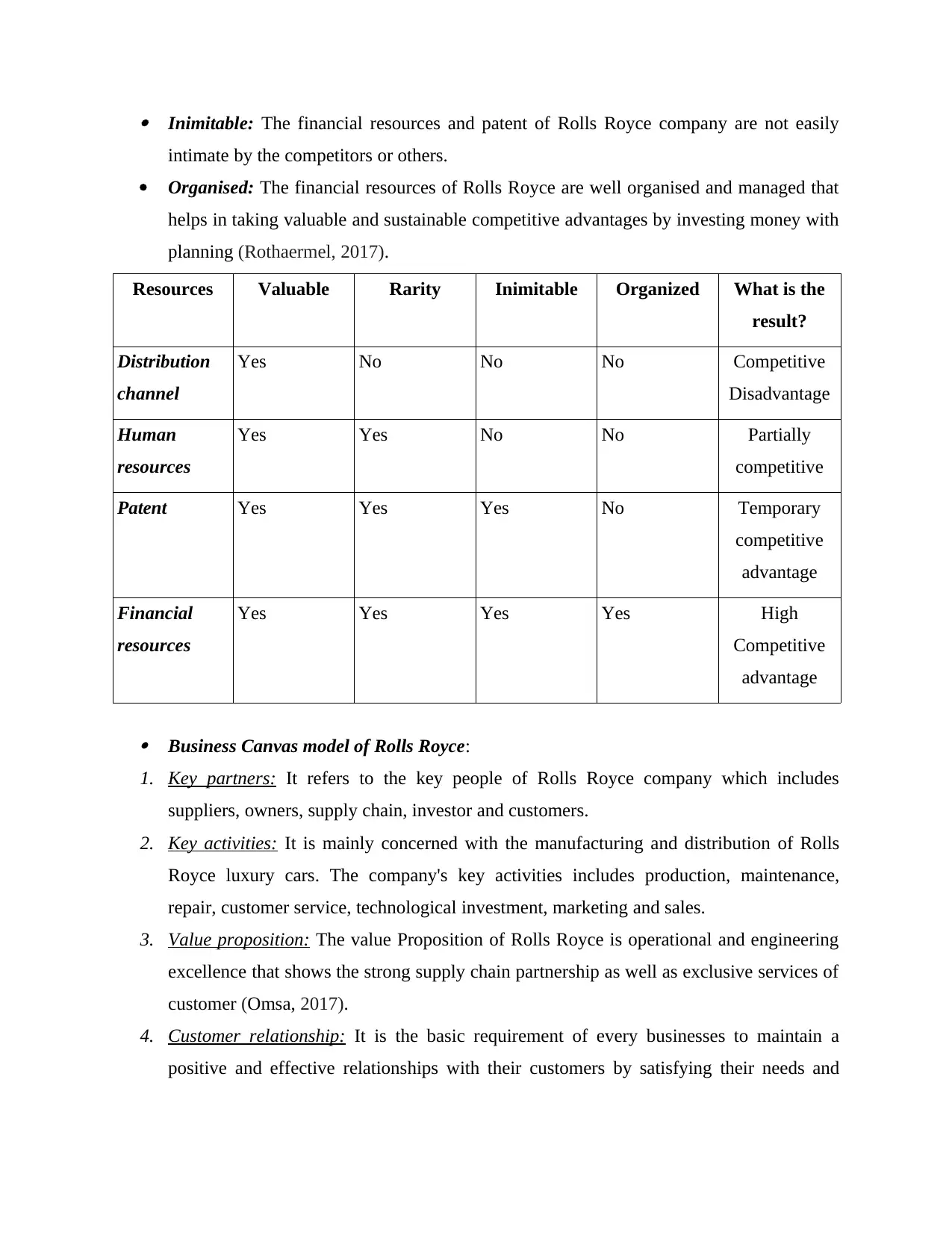
Inimitable: The financial resources and patent of Rolls Royce company are not easily
intimate by the competitors or others.
Organised: The financial resources of Rolls Royce are well organised and managed that
helps in taking valuable and sustainable competitive advantages by investing money with
planning (Rothaermel, 2017).
Resources Valuable Rarity Inimitable Organized What is the
result?
Distribution
channel
Yes No No No Competitive
Disadvantage
Human
resources
Yes Yes No No Partially
competitive
Patent Yes Yes Yes No Temporary
competitive
advantage
Financial
resources
Yes Yes Yes Yes High
Competitive
advantage
Business Canvas model of Rolls Royce:
1. Key partners: It refers to the key people of Rolls Royce company which includes
suppliers, owners, supply chain, investor and customers.
2. Key activities: It is mainly concerned with the manufacturing and distribution of Rolls
Royce luxury cars. The company's key activities includes production, maintenance,
repair, customer service, technological investment, marketing and sales.
3. Value proposition: The value Proposition of Rolls Royce is operational and engineering
excellence that shows the strong supply chain partnership as well as exclusive services of
customer (Omsa, 2017).
4. Customer relationship: It is the basic requirement of every businesses to maintain a
positive and effective relationships with their customers by satisfying their needs and
intimate by the competitors or others.
Organised: The financial resources of Rolls Royce are well organised and managed that
helps in taking valuable and sustainable competitive advantages by investing money with
planning (Rothaermel, 2017).
Resources Valuable Rarity Inimitable Organized What is the
result?
Distribution
channel
Yes No No No Competitive
Disadvantage
Human
resources
Yes Yes No No Partially
competitive
Patent Yes Yes Yes No Temporary
competitive
advantage
Financial
resources
Yes Yes Yes Yes High
Competitive
advantage
Business Canvas model of Rolls Royce:
1. Key partners: It refers to the key people of Rolls Royce company which includes
suppliers, owners, supply chain, investor and customers.
2. Key activities: It is mainly concerned with the manufacturing and distribution of Rolls
Royce luxury cars. The company's key activities includes production, maintenance,
repair, customer service, technological investment, marketing and sales.
3. Value proposition: The value Proposition of Rolls Royce is operational and engineering
excellence that shows the strong supply chain partnership as well as exclusive services of
customer (Omsa, 2017).
4. Customer relationship: It is the basic requirement of every businesses to maintain a
positive and effective relationships with their customers by satisfying their needs and
⊘ This is a preview!⊘
Do you want full access?
Subscribe today to unlock all pages.

Trusted by 1+ million students worldwide

requirements. Reliability and flexibility of Rolls Royce helps in developing customer
relationships.
5. Customer segment: It is the most important aspect for a company as they required to
know about the target market. In the context of Rolls Royce, rich or high class of people
consider as a target market of the company.
6. Key resources: As resources are required most for operates business activities in a
successful manner. Within the context of Rolls Royce, key resources are finance, humans
as well as distribution channels and so on.
7. Channels: Several kind of mediums are used to promote the luxury cars of Rolls Royce
as it use advertisement and social media marketing for the awareness and attract large
number of rich people (Shaqrah, 2018).
8. Cost structure: While running business activities several cost are incurred such as salary,
wages, rent etc.
9. Revenue stream: The revenue stream of Rolls Royce are income that occurs by selling
luxury cars as well as their maintenance charges also generate some rvenue.
Key Partners
Owner of
the
company
global
supply
chain
Custome
rs.
Investors
and other
stakehold
ers.
Supplier
code of
conduct.
Key Activities
Manufact
uring and
distributi
on.
Producti
on.
Maintena
nce and
repair.
Marketin
g and
sales.
Custome
r
services.
Value
Proposition
Operatio
nal
excellenc
e as a
strong
supply
chain
partnersh
ip.
Engineer
ing
excellenc
e.
Exclusiv
Customer
Relationships
Capturin
g after
market
value as
long
term
relations
hip.
Provide
in
service
experien
ce,
flexible
Customer
Segments
Rich or
high class
of people
and status
symbol
are the
main
target
customer
of the
company.
relationships.
5. Customer segment: It is the most important aspect for a company as they required to
know about the target market. In the context of Rolls Royce, rich or high class of people
consider as a target market of the company.
6. Key resources: As resources are required most for operates business activities in a
successful manner. Within the context of Rolls Royce, key resources are finance, humans
as well as distribution channels and so on.
7. Channels: Several kind of mediums are used to promote the luxury cars of Rolls Royce
as it use advertisement and social media marketing for the awareness and attract large
number of rich people (Shaqrah, 2018).
8. Cost structure: While running business activities several cost are incurred such as salary,
wages, rent etc.
9. Revenue stream: The revenue stream of Rolls Royce are income that occurs by selling
luxury cars as well as their maintenance charges also generate some rvenue.
Key Partners
Owner of
the
company
global
supply
chain
Custome
rs.
Investors
and other
stakehold
ers.
Supplier
code of
conduct.
Key Activities
Manufact
uring and
distributi
on.
Producti
on.
Maintena
nce and
repair.
Marketin
g and
sales.
Custome
r
services.
Value
Proposition
Operatio
nal
excellenc
e as a
strong
supply
chain
partnersh
ip.
Engineer
ing
excellenc
e.
Exclusiv
Customer
Relationships
Capturin
g after
market
value as
long
term
relations
hip.
Provide
in
service
experien
ce,
flexible
Customer
Segments
Rich or
high class
of people
and status
symbol
are the
main
target
customer
of the
company.
Paraphrase This Document
Need a fresh take? Get an instant paraphrase of this document with our AI Paraphraser
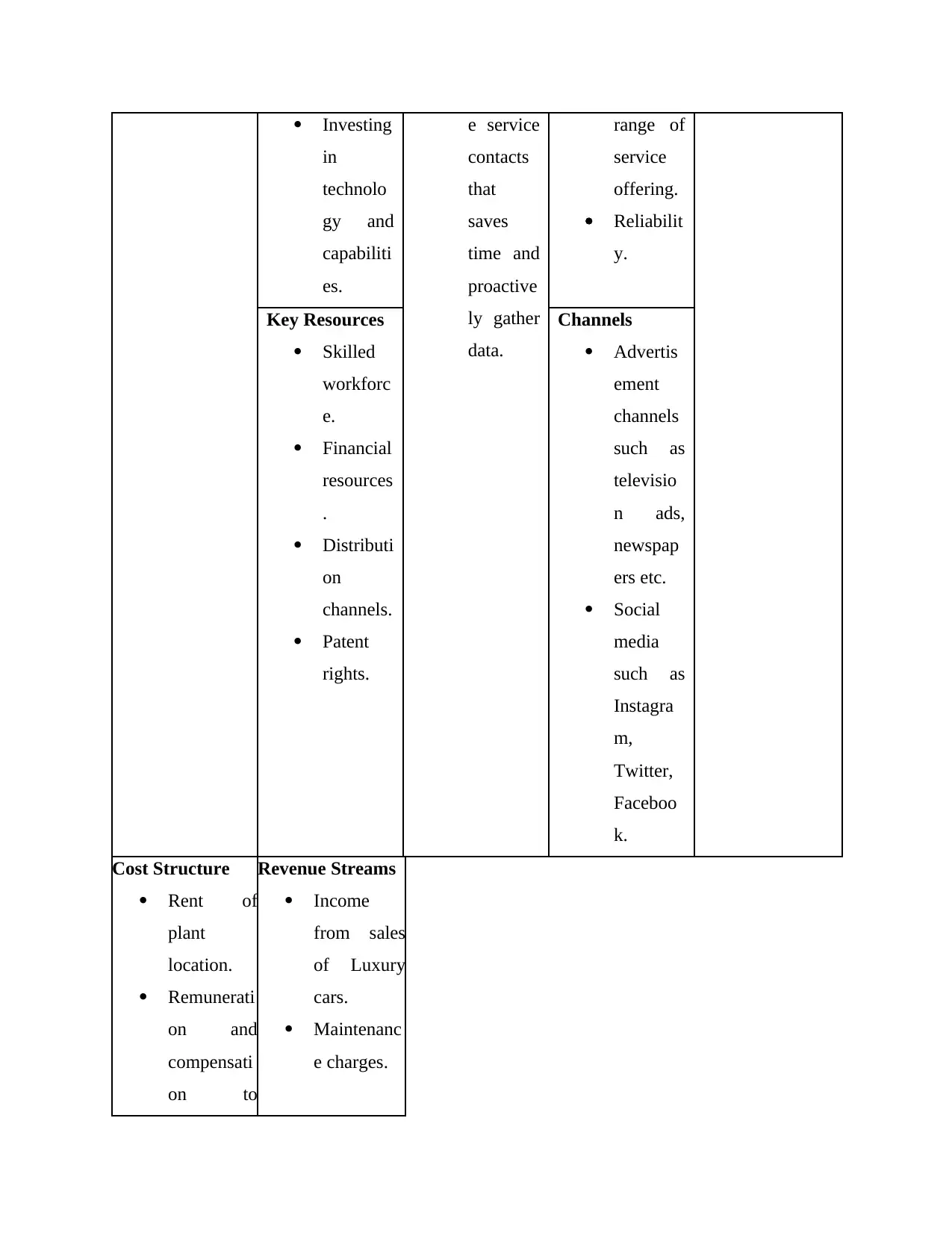
Investing
in
technolo
gy and
capabiliti
es.
e service
contacts
that
saves
time and
proactive
ly gather
data.
range of
service
offering.
Reliabilit
y.
Key Resources
Skilled
workforc
e.
Financial
resources
.
Distributi
on
channels.
Patent
rights.
Channels
Advertis
ement
channels
such as
televisio
n ads,
newspap
ers etc.
Social
media
such as
Instagra
m,
Twitter,
Faceboo
k.
Cost Structure
Rent of
plant
location.
Remunerati
on and
compensati
on to
Revenue Streams
Income
from sales
of Luxury
cars.
Maintenanc
e charges.
in
technolo
gy and
capabiliti
es.
e service
contacts
that
saves
time and
proactive
ly gather
data.
range of
service
offering.
Reliabilit
y.
Key Resources
Skilled
workforc
e.
Financial
resources
.
Distributi
on
channels.
Patent
rights.
Channels
Advertis
ement
channels
such as
televisio
n ads,
newspap
ers etc.
Social
media
such as
Instagra
m,
Twitter,
Faceboo
k.
Cost Structure
Rent of
plant
location.
Remunerati
on and
compensati
on to
Revenue Streams
Income
from sales
of Luxury
cars.
Maintenanc
e charges.
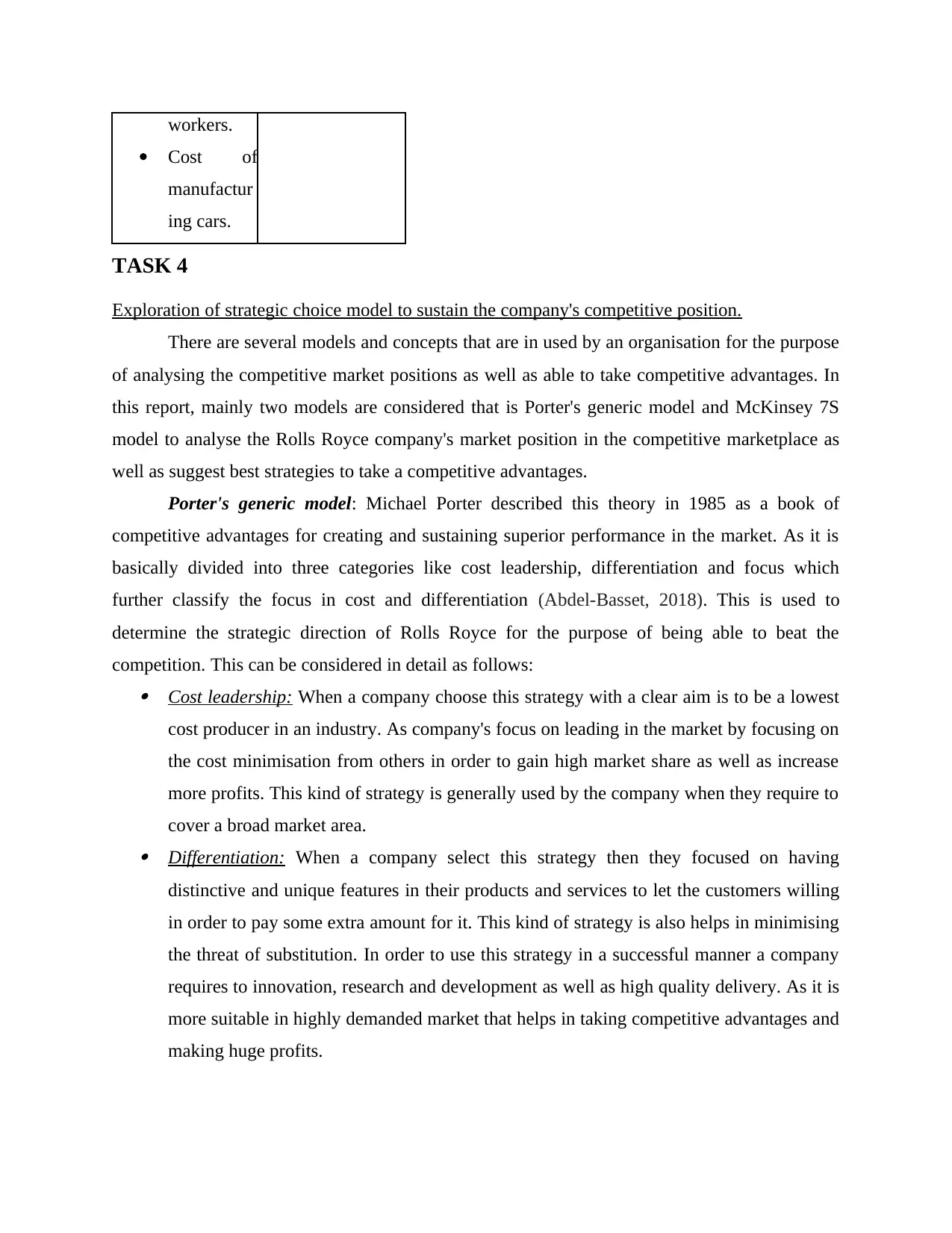
workers.
Cost of
manufactur
ing cars.
TASK 4
Exploration of strategic choice model to sustain the company's competitive position.
There are several models and concepts that are in used by an organisation for the purpose
of analysing the competitive market positions as well as able to take competitive advantages. In
this report, mainly two models are considered that is Porter's generic model and McKinsey 7S
model to analyse the Rolls Royce company's market position in the competitive marketplace as
well as suggest best strategies to take a competitive advantages.
Porter's generic model: Michael Porter described this theory in 1985 as a book of
competitive advantages for creating and sustaining superior performance in the market. As it is
basically divided into three categories like cost leadership, differentiation and focus which
further classify the focus in cost and differentiation (Abdel-Basset, 2018). This is used to
determine the strategic direction of Rolls Royce for the purpose of being able to beat the
competition. This can be considered in detail as follows: Cost leadership: When a company choose this strategy with a clear aim is to be a lowest
cost producer in an industry. As company's focus on leading in the market by focusing on
the cost minimisation from others in order to gain high market share as well as increase
more profits. This kind of strategy is generally used by the company when they require to
cover a broad market area. Differentiation: When a company select this strategy then they focused on having
distinctive and unique features in their products and services to let the customers willing
in order to pay some extra amount for it. This kind of strategy is also helps in minimising
the threat of substitution. In order to use this strategy in a successful manner a company
requires to innovation, research and development as well as high quality delivery. As it is
more suitable in highly demanded market that helps in taking competitive advantages and
making huge profits.
Cost of
manufactur
ing cars.
TASK 4
Exploration of strategic choice model to sustain the company's competitive position.
There are several models and concepts that are in used by an organisation for the purpose
of analysing the competitive market positions as well as able to take competitive advantages. In
this report, mainly two models are considered that is Porter's generic model and McKinsey 7S
model to analyse the Rolls Royce company's market position in the competitive marketplace as
well as suggest best strategies to take a competitive advantages.
Porter's generic model: Michael Porter described this theory in 1985 as a book of
competitive advantages for creating and sustaining superior performance in the market. As it is
basically divided into three categories like cost leadership, differentiation and focus which
further classify the focus in cost and differentiation (Abdel-Basset, 2018). This is used to
determine the strategic direction of Rolls Royce for the purpose of being able to beat the
competition. This can be considered in detail as follows: Cost leadership: When a company choose this strategy with a clear aim is to be a lowest
cost producer in an industry. As company's focus on leading in the market by focusing on
the cost minimisation from others in order to gain high market share as well as increase
more profits. This kind of strategy is generally used by the company when they require to
cover a broad market area. Differentiation: When a company select this strategy then they focused on having
distinctive and unique features in their products and services to let the customers willing
in order to pay some extra amount for it. This kind of strategy is also helps in minimising
the threat of substitution. In order to use this strategy in a successful manner a company
requires to innovation, research and development as well as high quality delivery. As it is
more suitable in highly demanded market that helps in taking competitive advantages and
making huge profits.
⊘ This is a preview!⊘
Do you want full access?
Subscribe today to unlock all pages.

Trusted by 1+ million students worldwide
1 out of 16
Related Documents
Your All-in-One AI-Powered Toolkit for Academic Success.
+13062052269
info@desklib.com
Available 24*7 on WhatsApp / Email
![[object Object]](/_next/static/media/star-bottom.7253800d.svg)
Unlock your academic potential
Copyright © 2020–2026 A2Z Services. All Rights Reserved. Developed and managed by ZUCOL.





